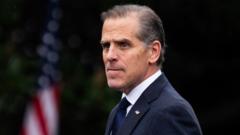With a looming deadline for new US tariffs, Canada asserts its commitment to securing fair trade terms, reinforcing the significance of maintaining strong economic ties.
**Canada Stands Firm Against 'Bad Deal' Amidst Looming US Tariff Threats**

**Canada Stands Firm Against 'Bad Deal' Amidst Looming US Tariff Threats**
Canadian Prime Minister Mark Carney prioritizes quality trade agreements over speed as the tariff deadline approaches.
Canadian Prime Minister Mark Carney has made it clear that Canada will not accept a subpar trade agreement with the United States, as the clock ticks down to the August 1 deadline for potential new tariffs by US President Donald Trump. "Our objective is not to reach a deal whatever it costs," Carney stated to reporters in Ontario, emphasizing that the focus is on achieving the best possible outcome for Canadians.
Without a negotiated agreement, US importers could face a steep 35% tax on Canadian goods. Despite being major trading partners, the relationship has been strained under Trump, who has implemented a series of tariffs aimed at bolstering American manufacturing and protecting jobs. Critics have warned that these measures could lead to higher prices for consumers in the US, thereby disrupting the global economy.
Trump’s tariff regime has already seen a 25% tax on select Canadian imports and a dramatic 50% tariff on aluminum and steel. In a response to these developments, Carney has indicated the possibility of further actions to shield key Canadian industries such as aluminum and lumber. He suggested that there may be additional protective measures taken in light of the impact these US tariffs may have.
Previously, Canada has responded with its own countermeasures, including increased tariffs on steel imports. “It will probably be the case in the next couple of months... we'll see other needs for support for the sectors that have been the most affected,” Carney told a gathering of provincial leaders.
Canada is substantially reliant on the US market, exporting about three-quarters of its goods, which include not only metals and lumber but also vital products such as oil, automobiles, machinery, food, and pharmaceuticals. In 2024, Canadian goods accounted for over $412 billion in US imports, while the US exported nearly $350 billion in goods to Canada, highlighting the deep interdependence between the two economies.
Trump's contentious tariff policies have drawn international scrutiny, as he argues that these measures are necessary to address unfair trading practices and combat issues like illegal drug shipments. However, US Customs data indicates that only a fraction of fentanyl seizures occur at the Canadian border, with most occurring at the southern border with Mexico.
As negotiations continue and new tariffs loom, the path forward remains uncertain. Trump's prior international agreements—including those with the UK, Japan, and Indonesia—have mostly retained higher tariffs, suggesting that contentious trade dynamics will persist. One recent agreement with the Philippines even increased tariffs on their goods, highlighting the trend of increasing economic nationalism in trade relations under the current U.S. administration.



















